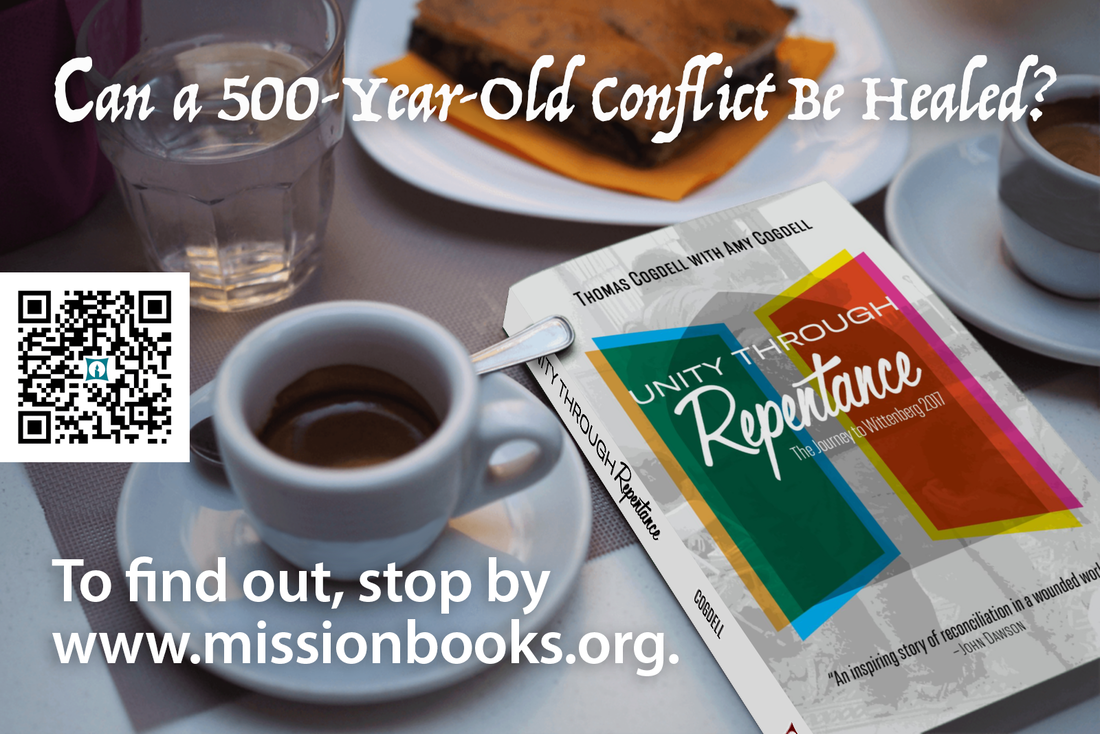Margarita's Story
By Margarita Flores
When my son knocks on the door and I go to open it, I yell from the inside, “Who is it?” He answers back, “its me!” His voice is so familiar. Excitement and joy permeate my entire being, and as I open the door, the expression on my face reveals a welcoming smile, and an accepting embrace tells us both we are home.
We are home! What a feeling!
On June 2012, I was invited to The Lausanne Catholic and Evangelical Dialogue on Christ’s Mission held in Chicago. It was there that I first heard about the Wittenberg 2017 Initiative. As time moved on, I started grasping the purpose of this event. This is to be the 500 years commemoration of Martin Luther’s nailing of the 95 theses to the door of All Saint’s Church; which began a chapter of history that has brought much brokenness, separation and isolation to Catholics and Protestants. So when I heard that the four-fold purpose of Wittenberg 2017 is “to gather Christians together for prayer, repentance, reconciliation and unity,” I felt committed to support.
As I read Psalm 23, the so common, but unique, and beloved Psalm, I experience a journey of reconciliation, healing and restoration. It is a symphony about God’s assurance for those walking close by his side. It is a poem that speaks directly to the joys and fears of us human beings who are committed to raising a prophetic voice. “Surely goodness and love will follow me all the days of my life, and I will dwell in the house of the Lord forever.” (v 6) I believe God is calling us back home to that place.
When I was a little girl, growing up as a Latina Catholic in a town where there was little tolerance or acceptance of evangelicals and blacks, I heard conversations and witnessed a rage that existed in the minds of my community -- so I know a little about prejudice and racism. When I asked my grandmother why people were so mean, she would always say; “because of their ignorance. So, let’s pray that one day we can see Christ in those who are different than us.” Then she and I would kneel and begin to pray the rosary. It was then that I recognized a need to develop a different type of conversation; one that appreciated the similarities and accepted the differences. I was determined to see Catholics and non-Catholics become friends in the unity of worship and the symbol of the cross as representing a believer.
When I first entered Fuller Theological Seminary for post-graduate studies, I was looking for a school that would provide me with the opportunity for a multicultural and mission experience. The diversity of an interdenominational approach in ministry that Fuller presented was something that attracted me as part of my desire for higher education. I believed then and now, that my mission and vision were to be dedicated to addressing and eliminating all socially constructed -ism’s, stereotypes, and prejudices that have historically been used to discriminate and segregate groups of people. As a Roman Catholic and a Latina, I wanted to understand why, in many of our traditions, we still were not able to stay in conversation without bringing in our own arguments that separated us instead of finding items that would bring us together. My questions at that time were: How can I bring a transformative and constructive language into my own sharing as I sought to live out 1 Peter 3:8: “Finally, all of you, have unity of spirit, sympathy, love for one another, a tender heart, and a humble mind”? How can I represent my tradition and be willing to learn from others? How can I do and learn my Catholic theology in a different context of reflection? These and other questions were part of my initial curiosity as I entered Fuller Seminary.
Achieving a Masters in Divinity (2007) gave me the ability to seek greater possibilities as a Latina and as a Catholic. As a woman of color in an ever-changing Latino culture in America, I’ve had the opportunity to reach horizons never before opened in the Archdiocese of Los Angeles, where the position of Parish Life Director was first made available in 2006 for lay ecclesial minsters.
As Parish Life Director, I was a lay leader who was entrusted with the leadership of a parish. I am convinced that the opportunity and experience at Fuller equipped me, and from there, doors began to open. It was not just an open door to the position of being appointed as a Parish Life Director, but also to an environment that continues providing me with the affirmation of my call and vocation. I welcome the conversations, discussions and one-on-one’s with colleagues, professors and friends. The possibilities for the future continue to expand.
I am a mother of six children, all grown and nearly finished with their higher education. As I entered into this new generation with its constant changes, my children are now teaching me the power of creating new possibilities. And like my grandmother’s prayers, I pray that with every involvement, every encounter and opportunity, we can grasp throughout our conversations the unique presence of God in our everyday life journey. As for my own journey, I have learned that there is often no place to really call home. But in the larger context, home is where acceptance, reconciliation, and genuine encounters reflect God’s love.
Wittenberg 2017 definitely makes me feel like we are journeying to our real Home!
What unexpected new horizons have you encountered on your journey?
In what ways has ignorance separated or distanced you from individuals different than you?
In what ways can you faithfully represent your tradition, while at the same time be willing to learn from others?



